#chicago analysis
Explore tagged Tumblr posts
Text
"Seven years ago we all went through the flames; and the happiness of some of us since then is, we think, well worth the pain we endured."
Although Dracula was published in 1897, some think that it takes place in 1893 because of the way the days and dates used line up. If that's the case, Jonathan Harker's epilogue, seven years later, would have been added around 1900. A new era bubbling with new change and new conventions. The story ends with Jonathan looking ahead to a new century filled with the unknown and being able to look on the past, despite its darkness, "without despair."
#dracula#dracula daily#November 7#thanks to anon who mentioned 'new woman' term didn't get officially coined until 1894#but at the same time certain technology mentioned in the book didn't get its stride until the early 1890s#by publication it ends near the end of the century either way#but ending exactly on 1900 would be an extra nice touch#Jonathan harker#mina harker#1893 was also the year that electricity was displayed on a large scale for the first time at the Colombian Exposition in Chicago#also known as the “World's Fair”#bram stoker#quincey morris#jack seward#abraham van helsing#arthur godalming#the emphasis on modern methods and technology and unconventional characters throughout and then ending with the beginning of a new era#dracula analysis#dracula thoughts#one of those things where you wonder if it was intentional or just worked out really well#twilight-zoned-out#did not keep up with drac daily very well this year#but congratulations to those who did
263 notes
·
View notes
Text
This is the pettiest thing I will ever post. But when I see Gray Wing put up with the song Mr. Cellophane I think,
Don't you dare compare Amos Hart to that hideous beast. Amos deserves the ENTIRE WORLD and also A UNION
good. gray wing deserves this, actually. Cry about it
It does legitimately interest me though, how the song becomes re-contextualized by changing the singer like this.
For those who don't know; Chicago is a musical about awful people and the way Roxie Hart and her lawyer, Billy Flynn, are able to whip the media surrounding Roxie's trial into a tool to get her acquitted of a coldblooded murder.
It's about trickery, with the only two well-meaning people in the entire cast taking the consequences. A hotshot prosecutor hangs the only innocent woman in the jail (Hunyak, a Hungarian who can't speak English and whose public defender refuses to do his job), and Roxie's husband, Amos Hart, bankrupts himself to pay for Roxie's lawyer.
Roxie haaaates Amos. She lies to him about her victim, convincing him cover up her murder, only for it to fall apart when he finds out she had been cheating on him with this man and the truth comes together. Yet, he still spends every cent he has on Billy Flynn, a very expensive lawyer, to save her from the noose.
He's not a smart man, and that's the tragedy. He's a rube she takes advantage of. She was always planning to leave him.
The whole time, Amos is kept out of the loop and used in even more schemes. Roxie feigns pregnancy to get media sympathy, frames him as a mastermind who "convinced a nun to elope one day," and ignores him for the entire trial before leaving him in the end.
So when he sings Mr. Cellophane, what that serves is to show that Amos wants ONE thing. He just wants to be noticed. Not loved, he doesn't want to own her, he doesn't wish he never paid for her defense. He wants to be NOTICED.
And that's very unlike Gray Wing, but people will hear Mr. Cellophane out of context and just think it's about sadboy pining.
Gray Wing treats Turtle Tail like shit as he obsesses over Storm, who was never interested in him. He treats her buddy Bumble like shit and yells at Turtle for having the wrong friend. He doesn't run after heavily pregnant Storm when she leaves Clear Sky for being a controlling, war-hungry monster who argues with her in public and exiled his disabled brother.
He holds a grudge against Bumble for "taking" Turtle from him, happy to watch her dragged back to a domestic abuser, and couldn't give less of a shit when she dies violently because she just HAD to go and get herself killed by his Beloved Brother and now no one will like him :(
And even worse-- he's NOT Mr. Cellophane. People think Gray Wing is the wisest motherfucker in the forest, they run after him and beg him to help them lead all the time, trusting his dumb, terrible choices and clouded judgement to the point of absurdity.
He's the writer's pet, even "rewarded" with a woman in the end to birth his biological kittens
There's something really interesting in that, though.
The song from the mouth of Amos Hart, it's insight to his goodness. Even after all this mistreatment, after being so OBVIOUSLY taken advantage of, slandered, drained of everything, all he wants is to be noticed. It's a fatal flaw.
In the mouth of Gray Wing, it's whining. It's the same bitching and moaning he does all series long, crying about how people don't listen to him when really they should listen to him less. It's "But I'm a Nice Guy!" entitlement, a refusal to self-reflect on why those three women didn't fucking like him. A fatal flaw, but in the opposite way.
#dotc hate#media analysis#Also it's too bad that Cellblock Tango is the only thing most people know about Chicago lmao#Everyone should go watch Chicago#One of my favorite movies actually. Funfact about me is that I loooove musicals
56 notes
·
View notes
Text
There are very few stories that do the trope of a good character slowly becoming more corrupt by their circumstances and it gets to the point that season 1 character wouldn’t recognize them ( a facet of grumpy/sunshine character’s slowly switching places)
One of my favorite examples of this is Chicago PD. In one of Jay Halsteads last appearances in the show he makes the comment, “we’re doing it again”. This comes on the second happenstance of the team covering up an unjustifiable killing.
You can see as we go from season one Jay who makes no secret of not trusting Voight and practically outright saying he’s dirty to season 10 Jay who is slowly turning into Voight by letting more and more things slide.
I feel like it gets to a point where you can see the guilt eating Jay alive which is why he leaves.
Anyway please let me know if you disagree with this take or if you have any thoughts!
Honorable mentions for this trope: Merlin from BBC’s Merlin, Lucy from The Rookie and I’ll come up with other characters shortly
#chicago pd#jay halstead#themes of corruption#I’m surprised that’s not a tag#stoned thoughts#literary analysis#maybe?#I think I did this right#grumpy/sunshine#tropes
7 notes
·
View notes
Note
Ooooooooooh please do a character study on Will Halstead please 🙏🏼
Will Halstead is a lot of things. He’s arrogant. Loyal. Hot-headed. But he’s also so filled with love and other things that make him so interesting. I’m gonna try and keep this as organized as possible but I will apologize now if things get jumbled.
Personal / Early Life:
Will is an older brother. That is the canon that both his actor (Nick Gehlfuss) and Jay’s actor (Jesse Lee Soffer) have agreed on and it’s the one I also agree on. It makes sense for it to be this way, and this isn’t just me pushing the oldest child label onto him in a self-satisfying way.
He’s a doctor. Sure he isn’t because it was forced on him but him taking on the role of caretaker for others fits the mold for what the eldest child deals with. We see him standing up for others, Maggie of course comes to mind first, but she’s not the only one. Natalie, Jay, etc. Anybody he cares about comes out and ends up being a person under his wing.
Let’s get to his childhood life. We canonically know so little about the Halsteads lives which honestly sucks and is crazy since we met Jay back in 2012? 2013? Whichever and then Will in 2015. Jesse (Jay) left in 2022 and Nick (Will) left in 2023. That’s roughly ten years of the Halsteads and this is what we know about their parents:
Their mom died
Their dad’s name is Patrick and he valued blue collar work over what both his sons did
Their mom said whoever found the right girl first got her ring
That’s it. Patrick Halstead was killed off before we could really get a look into what their relationship was like to the full extent. We know Will and his dad had a better relationship than Jay but still. That isn’t much.
One thing that really irks me is that we never even got a name for their mother. All the talk about her ring, the mentions of how her dying of cancer affected the boys and yet we never even get to put a name or face to the woman. Hell, we don’t even know what type of cancer killed her.
As we get a little older in Will’s life, we know he was bullied but that never seemed to have affected him. He was still so outgoing and willing to put his piece in regardless of what the stakes are.
A few years further in and he’s in college. That’s when his mom gets sick. Jay comes home to help out, Will doesn’t. We never really get an explanation about that either. Was he too wrapped up in school? Was he really too busy partying and drinking like Jay said that one time? We. Don’t. Know. And I hate it.
Because that is not the Will Halstead we know. The Will we knew would have been by his mother’s side as long as he could be. The only way he wouldn’t would be if he was out there trying to find a cure to her sickness.
We know he’s religious as well. That can be assumed to be connected to their mother. Patrick never seemed too religious in our 3-4 brief interactions with him so I can only imagine that it was Mrs. Halstead that got them into the church, made them into altar boys, etc. That it’s her doing that Will has a cross tattoo on his left middle finger and proudly wears a gold chain with (most likely) a religious pendant on it.
Though I still can’t find out / figure out 100% for sure what it is, my belief is that the pendant is a celtic knot for the fact it is an Irish Catholic symbol (also an old pagan symbol so… Will Halstead we are one). Anyway, I know for a fact he still holds ties to his catholicism but I do believe it is probably in the way of honoring and showing love to his late mother type of way rather than how he truly feels.
Pre - One Chicago:
All we really know about the time post college and pre-med is that he did a stint in Sudan before he moved to New York City and he was a plastic surgeon there for 7 years. There he was fired but again, we don’t know why.
Granted, do we need to know why? No. But it gives a small crumb to the cookie that is Will Halstead as an entire person. From the fact he was a surgeon in NYC, I can do my best to assume that in Sudan he was probably a field medic of some sort. Maybe someone that does all the stitching on injuries? But truthfully I don’t know enough about what was going on there at that time (if anything since it is a television show) to make a good guess.
But in NYC, I like to think that he had a nice enough apartment, probably lived smack in the middle of the city with (possible) a partner, maybe had a dog? A cat even if he was working a lot and his partner was too.
Also, I’m saying partner because I am a firm believer and supporter of the bisexual Will Halstead agenda. This man lived in NYC in the early 2000s + he went to college there. Even if he isn’t the entire fruitcake, he is still an ingredient.
Love life:
To jump into that, I fear my man has no game. He’s hot, he can kinda flirt but I feel like he can only do it when he’s already got feelings for you; ie. Natalie. He probably dated one girl in high school maybe since he was bullied, dated a girl for a few months at the beginning of college before having an entire epiphany later that year/the next with a boy that lived in his dorm and they had a (secret) thing that actually lasted pretty long.
After that though, aside from maybe a couple dates (going out for drinks) and hook-ups, I think Will’s next really big relationship was Natalie.
Relationships:
Will is amazing at creating tight and strong friendships, relationships, any connection really. I feel like he’s the type of person to actively try and make himself as warm and welcoming as he possibly can
He’ll give a small and short smile to make sure that a woman passing him on the street doesn’t think he’s horrible, he’ll help a kid reach something on a taller shelf because he’s literally 6’1 so he has height for days.
And that’s just the baseline because I’m writing this at almost 1am and other ways of helping people and being there for them aren’t coming to my mind.
This is definitely shown in his relationship with maggie specifically. He is always there for her, so much to the extent that he is invited to her family cookouts/parties. He’s there for her and her sister when everything that happens happens.
Obviously this goes without saying but he is so respectful of Maggie’s sister and her being trans which is just refreshing as a whole because on television you don’t always trans representation and sometimes it’s half assed. Sure one chicago could do better in general on their LGBT rep but then letting a main and loved character treat it so normally is just so nice and refreshing to me.
I don’t know what else to really say about Will except that he is just such an emotionally driven man and we don’t see male characters driven by emotions other than rage much and I adore it and him.
Teddy x
does this even count as what you wanted?
#will halstead#one chicago#chicago med#teddy talks#character study#character analysis#chicago med analysis#will halstead character study#will halstead character analysis
4 notes
·
View notes
Text
iirc episode 6 of s1 of the bear is the closest we get to acknowledging Le Gentrification. that's a pretty central theme of that episode obviously, though its done through richie kind of losing his place in the world as it constantly changes and dies around him. his conflict with that change is extremely visible in how he relates to sydney, which i think kind of muddles that theme a bit? sydney's treatment by richie (and carmy, though i haven't seen that discussed as much) feels incrediblyyyyy racialized and his war against her gets combined with his fear of everything around him changing. when he goes through his character development moment in s2, he finds that he actually fits in beautifully with the newly whitewashed Bear and he's able to start cooperating better with sydney as well, and its like...hm. his conflict. in episode 6. that fear of change. its shown as largely a personal issue and causes him to butt heads with sydney and to call the cops on her handiwork later on. its hard for me to express in a more coherent way but it feels like the show is conflating his issues with the bigotry he later attempts to unlearn and we see him improving and growing on both fronts through how he adapts to the fine dining atmosphere. and this is an interesting vehicle to show that, but it also means that the gentrification stuff is kind of just hovering uncomfortably over your shoulder and i don't know if that's intentional or not. because the bear DOES show its black characters with so much love and compassion and respect for their flaws and their struggle to live in the world and be part of it and their desires and learning to strive for more than they were. it just...hm. a lot of characters realize they want Something Greater through joining the world of fine dining. which is cool! but the beef is still closed for this and there is still an existing base of people who ate there who are not going to anymore. that's a community you're losing! that's a community that you're not feeding anymore! what do the longtime employees of the beef feel about this and why is this a conflict that's mostly shown through richie's pov
#i dont think its intentional persay but conflating a resistance to gentrification/'change' more generally with richie's#overall stagnation feels like a sleight of hand that i don't care for but again i do not know if that's......conscious#the setting is a MASSIVE part of the bear at least early on the beef is very much a character there is a kind of#magic realism thing going on where the building is attuned to the workers within it very well and like#it is set in chicago and proud of that so the setting is not something to be sneezed at at least in s1#(i have not watched s2 50000000 times like i have s1 so i may need to refresh my memory on that front)#so. ? what are we doing here. i don't think this is the focus of the show and that's fine but i am curious as to why a little bit#im hoping thats the direction s3 takes (took. have not been able to watch it yet </3) because honestly i cannot imagine#a compelling future of the show where we're just chilling replicating the environment that made carmy Like That#my analysis skills are a little rusty so i dont think this is well put or compelling but it is something i was thinking about#before i went to work and became the joker well anyway thanks for reading
11 notes
·
View notes
Text


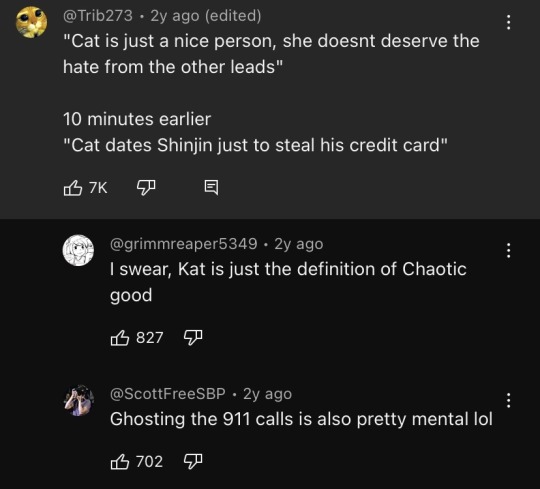
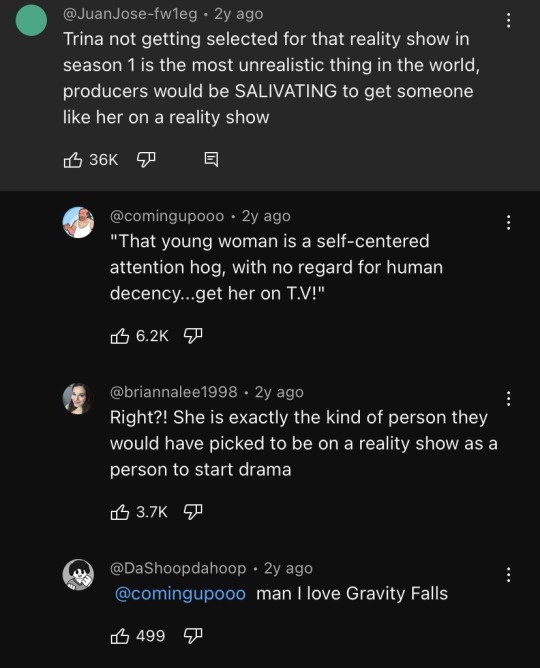


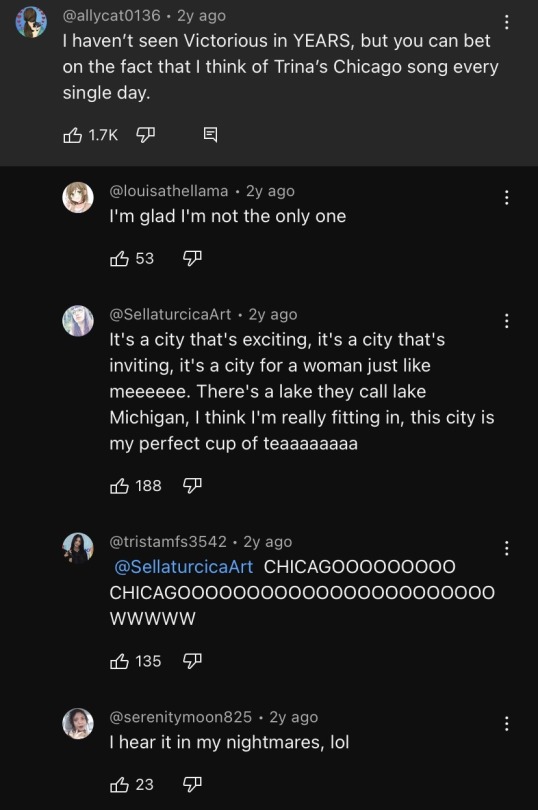

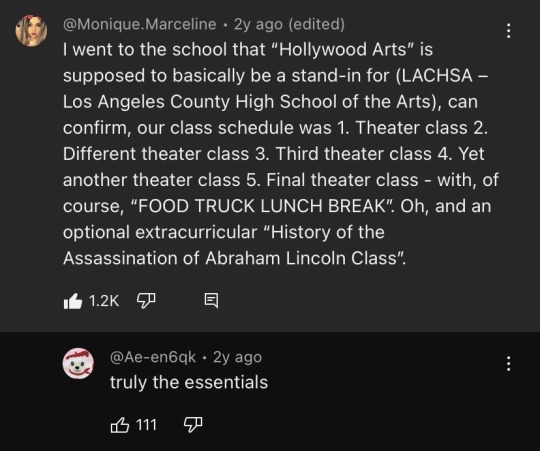

#quinton reviews#youtube comments#victorious#nickelodeon#chicago#trina vega#victorious rex#sam puckett#dan schneider#cat valentine#sinjin van cleef#gravity falls#what type of friends you have if they don’t support your crippling addiction to long video analysis?#andre harris#leon thomas iii is so talented#healthcare system#even for puppets#girls’ toys#playing dolls was like a novella for real#CHICAGOOOO
13 notes
·
View notes
Note
How do you make it through the Slaughterhouse Nine clone arc? It just feels like endless “who would win” mashing your dolls against each other hypotheticals? Nine cherishes could beat three teams working together, etc—feels like it’s impossible to care about any of the characters involved and what happens
Great question! See I also didn't appreciate the S9k arc until my 2nd read-through. It definitely suffers the most from the missing 2 Chicago Wards arcs that should've been written - the abrupt transition really throws off the otherwise very well paced book
However, the S9k arc is really important for *Taylor*
Remember that no one but Cauldron knows anything about GM - Taylor's acting hypothesis is that Jack will cause a 2nd trigger during his mayhem that ends the world. So this moment is EVERYTHING that Taylor has been working towards for over two years - the reason she left the Undersiders, the reason she works her Wards to the bone, the reason she's been on a one-girl crusade to make allies and break uncooperatives. So in a lot of ways, it's Taylor's time to shine. She took Dinah's 'prophesy' more seriously than anyone, Chevalier lets her take the lead, and we get to see her at her most badass.
Jack, on the other hand, is in it for the fun and chaos - he treats 8 out of each 9 clones as totally expendable - it's boring to have more than one crawler or more than one Winter - his ideal scenario is watching the fireworks as 8/9ths of them die, and taking one of each remainder and creating a much more tightly focused marauding band.
Meanwhile, we get to see Dragon unleash her full potential, after years of incremental freedom she can undercut the S9 at all fronts - the 8 cherishes are a great example - Jack wasn't counting on Dragon's progress so those 8 cherishes on the bus were intercepted long before they reached their destination and started wreaking havoc.
Plus, there was a lot of cool & tense shit that you just gotta enjoy, before the real tragedies begin
#Worm#Wildbow#Parahumans#Worm analysis#Slaughterhouse 9#Taylor Hebert#Jack slash#Dragon and defiant#S9k#Chicago wards#The Undersiders#skitter#Weaver
52 notes
·
View notes
Text
I think I should be allowed to quote that “two Kinsey 5s making it work” review of Much Ado 2011 in my essay due tonight
#quick how do you cite a letterboxd review in MLA#I fucking hate MLA I’m a Chicago girlie this is the WORST#anyways I’m doing a production and script analysis/comparison of the masquerade scene#and it’s due in less than 3 hours KILL ME 😭#much ado about nothing#shakespeare
7 notes
·
View notes
Text
listen if u explain the reference to paris hilton with the chuck taylors as being a great example of using an anachronism to say something about both the past and the present, but then don’t explain the MUSICAL REFERENCES to lily allen & avril lavigne’s MUSIC in a MUSICAL and how that might be making a comment on both our current culture and history than i think maybe you just don’t really listen to musicals much and that’s fine but maybe preface it with “i understand i’m the baby and you’re socrates in that meme” so i don’t have to STEW OVER IT for DAYS ON END.
#six the musical#if the analysis is ‘i don’t think what that story says is strong’ that’s fine but if u don’t analyze the MUSICAL REFERENCE. in a MUSICAL.#i mean what are we doing here are we being silly#this is under a cut because i don’t want to seem like a bitch for still being annoyed about this. i was just so irked by people agreeing#when it was like…but you didn’t explain the crux of the reference?? SILLYNESS!!#this is about six again aksjdjdj i’m sorry that this musical took over my brain.#beetle juice is coming to chicago so i’m gonna let that one take over next. be prepared.#i’ve listened to a few songs but i’ve never really sat down and gone the whole way through#rani makes text posts no one will read
2 notes
·
View notes
Text
The number of dreams I have in which I am naked or half dressed in public is out of pocket.
I hate it. Every time it happens, I can feel real me panicking in my sleep. Dream me never finds any clothes, just a towel (like last night's dream) or a too small something.
Every time, it feels so real even though I'm dreaming, and I know I'm dreaming. These are the only dreams I have where I'm not lucid dreaming. I am fully aware it's a dream, but I can't do anything about it.
I will say last night's had a better ending than most of them. I eventually stopped panicking, wore the towel top, saved the world, got flirted with by a guy I knew from high school, and got free wings. Normally, I spend the entire dream trying and failing to cover myself.
Last night, I was thankfully wearing pants, a cousin had a towel, I tucked underneath my arms, then having to walk through dream chicago with a majority of my family after I decided to go to dinner with them instead of traveling around by myself like I usually do. Then I got to the restaurant and decided to go to the more relaxed pub food section of the restaurant. Also, I was a former Power Ranger and was fighting 3 evil original toy versions of Optimus Prime. This whole dream was wild. People were being tricked into using open restaurant public compost toilets. While off-brand and nice, Irina and Micah from Love Is Blind, and I found the real bathroom and had a good crack up.
#dream analysis#dreams#dreaming#love is blind#meaning of dreams#dream meaning#optimus prime#chicago#composing#power rangers#dream catcher#mr sandman#lucid dreams#anxiety dreams
3 notes
·
View notes
Text
youtube
This is a video essay analyzing the character Amos Hart from Chicago: The Musical
#character analysis#analysis#musical theater#musical theatre#musical#movie#theatre#chicago the musical#chicago#amos hart#Youtube
0 notes
Text
Debunking the Myth: Chicago Outlaws MC and Chicago Mob Collaboration
#OUTLAWS #CHICAGOOUTLAWS #OUTLAWSMC We delve the truth behind the rumored partnership between the Chicago Outlaws MC and the notorious Chicago Mob. Join us as we separate fact from fiction to reveal whether these two powerful entities are truly working together or if it’s all just a captivating myth. Discover the web of speculation in our quest to tell the real story behind this fantasy of…
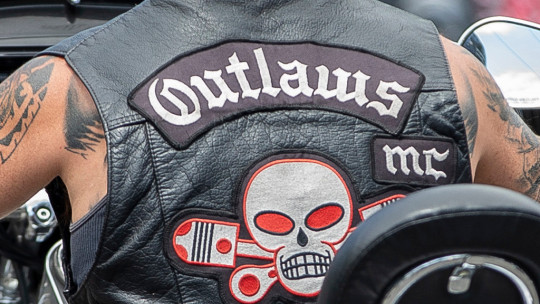
View On WordPress
#Biker News#Chicago Mob#Chicago Outlaws MC#Chicago Outlaws MC and Chicago Mob Collaboration#Collaboration Rumors#Crime Syndicates#Criminal Alliances#Criminal Underworld#Debunking Myth#Fact vs Fiction#insane throttle#Investigative Analysis#organized crime#Truth Uncovered#Unveiling Truth
0 notes
Text
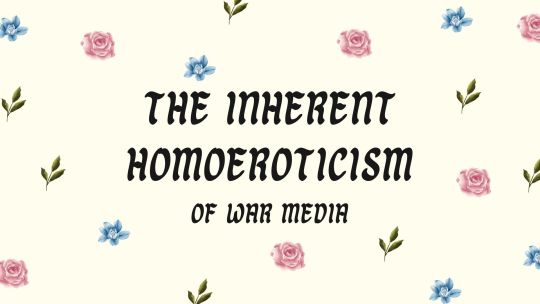

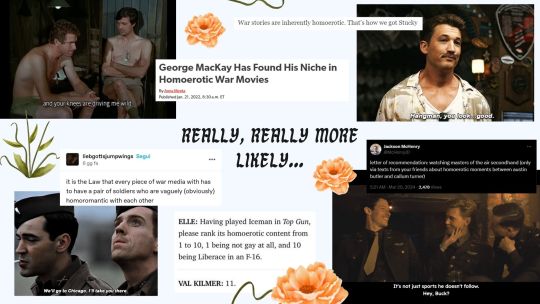
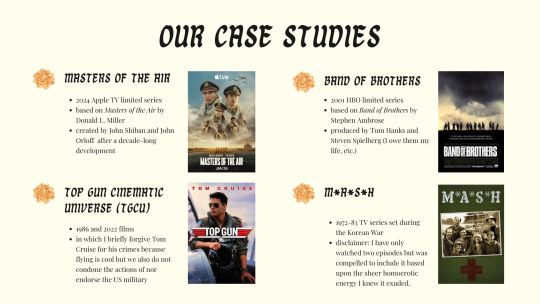

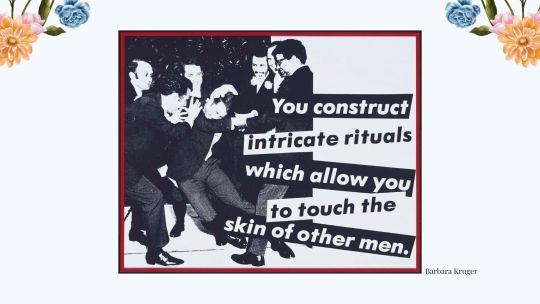
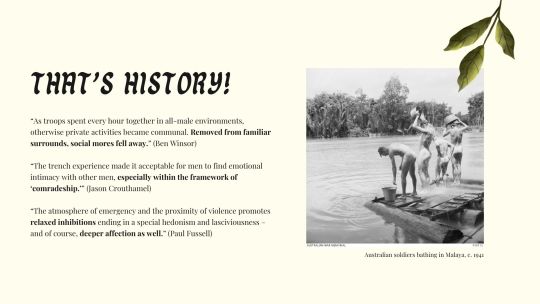
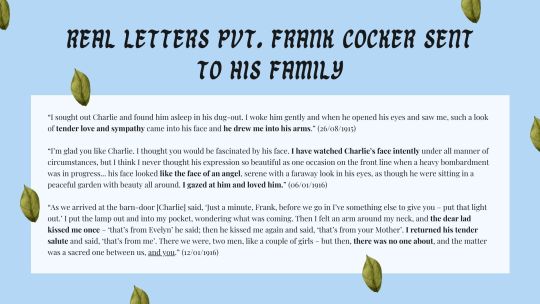


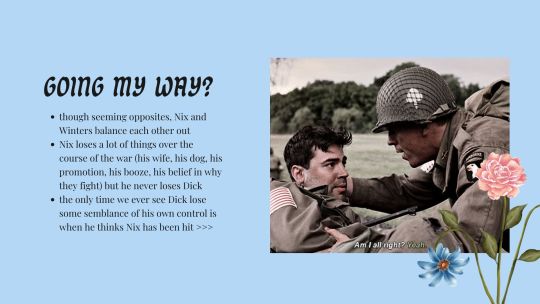

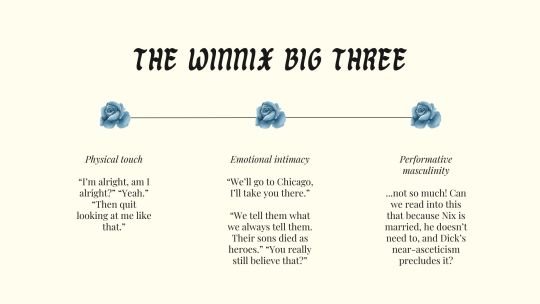
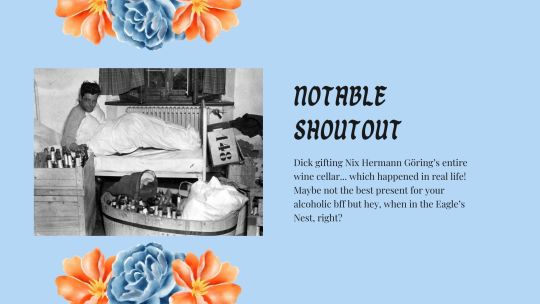
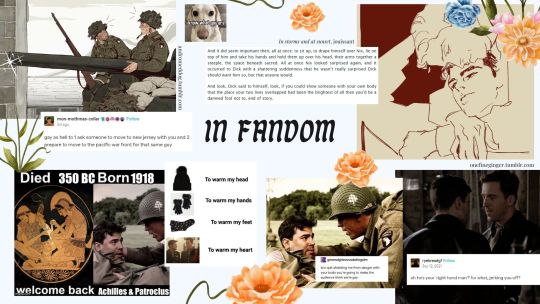





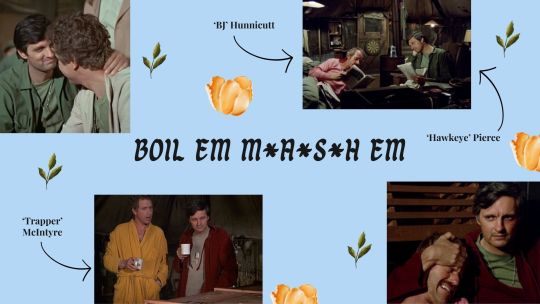
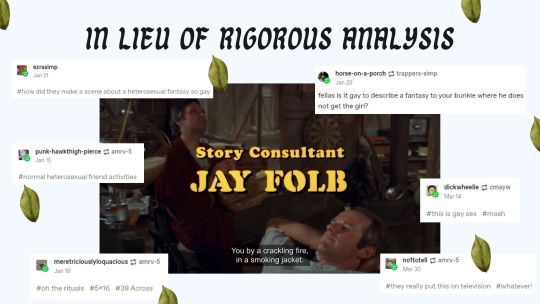

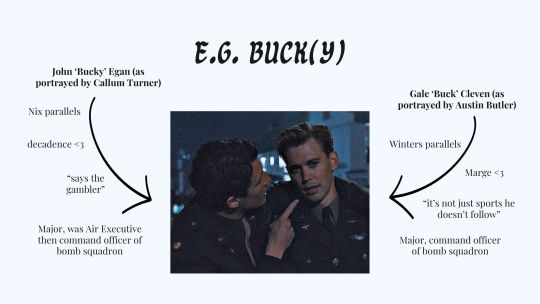

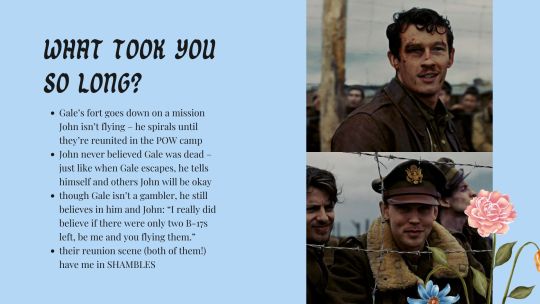


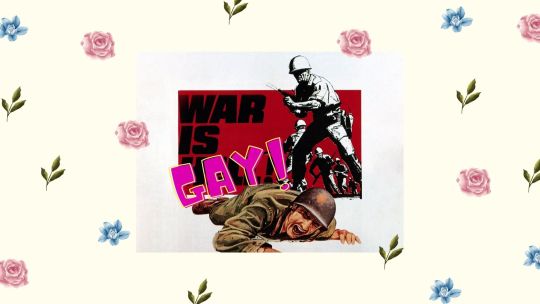
the inherent homoeroticism of war media: a completely unserious presentation by me
[note: some slides have been removed because they're literally just fancams and also i had more than 30 slides boo tumblr image limits]
BIBLIOGRAPHY (just going in order of slides)
and your knees are driving me wild - mash s02e08
george mackay has found his niche in homoerotic war movies
war stories are inherently homoerotic. that's how we got stucky
hangman you look good - top gun: maverick (gif by babyrooster)
letter of recommendation: watching masters of the air secondhand
it's not just sports - masters of the air e02
1 being not gay at all, 10 being liberace in an f-16
we'll go to chicago - band of brothers e01 (gif by @fkmylif3)
it is the law that every piece of war media
kim is a homoseggsual - kath & kim s01e02
Untitled (You Construct Intricate Rituals) - Barbara Kruger
The Secret History of Australia's Gay Diggers - Ben Winsor (+ Paul Fussell quoted within)
Sexuality, Sexual Relations and Homosexuality - Jason Crouthamel
Soldiers bathing in Malaya - AWM
Private Frank Crocker letters featured in Sebastian Faulks and Hope Wolf, A Broken World: Letters, Diaries and Memories of the Great War (2014), pp. 75-78.
mike's mic screencap my beloved <3
winnix gifs by @bandofbrothers2001 @preacherboyd @galebucky
winnix art by @andromeddog
winnix art by @onefineginger
In storms and at sunset by jouissant
winnix memes/text posts: 1 (@bleedingcoffee42) 2 (@krakerjaksstuff) 3 (@claudycod) 4 (@lewis-winters) 5 (@mon-mothmas-collar)
man is a hopeless creature i don't like much of anyone (@sluttyhenley)
You Create Intricate Rituals: The Homoerotic Action Movie - Rebecca Radillo (Lyvie Scott featured)
val kilmer icemav warrior compliation by @mavernick2
t as in top gun: maverick (@misaothewitch)
which is gayer (@holypowell)
we're fools to make war by whimsicule
all my roads lead back to you by liadan14
m*a*s*h video by @amrv-5 (+ reblog tags)
clegan/buck(y) gifs by @4o4notf0und @rcbertleckie
clegan fanart by @ifapromise <3
clegan memes: 1 (@rcbertleckie) 2 (@season-two) 3 (@ww2yaoi) 4 & 5
bomber's moon by moonrocks
**i tried to tag/link everything, if anything is broken or unsourced please let me know and i will endeavour to fix it! standard disclaimer that a) any discussion about war media based on real life people is based upon the fictional portrayals of those people and not the actual dudes. and b) this powerpoint was made for fun, it is not rigorous academic analysis. all opinions expressed are my own. please do not take it too seriously! that's all <3
#hbo war#hbowaredit#band of brothers#bobedit#masters of the air#mota#motaedit#top gun#top gun maverick#mash#m*a*s*h#clegan#winnix#hangster#icemav#liz makes things#web weaving#maybe?? idk!#GOD OK BE FREE GO INTO THE WORLD <3#edit i have since seen like 10 mash episodes but i'm not redoing this.#edit edit i just realised i have a citation for a mikes mic screencap that is not here bc its on a deleted slide oopsie
3K notes
·
View notes
Text
updated verses for lexie (this bitch out here having so much fun)
#&.* a.r. | v. season one#&.* a.r. | v. season two#&.* a.r. | v. season three#&.* a.r. | v. season four#&.* a.r. | v. season five#&.* a.r. | v. fugitive task force#&.* a.r. | v. one chicago#&.* a.r. | v. law & order#&.* a.r. | v. behavioural analysis unit
0 notes
Text
There’s no such thing as “shareholder supremacy”
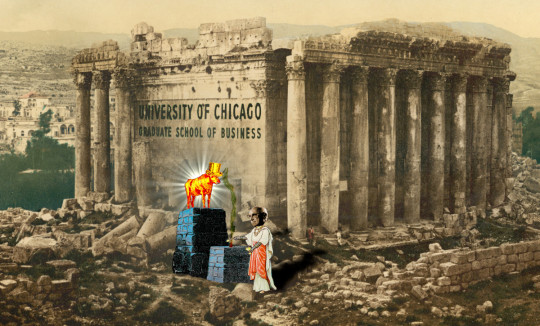
On SEPTEMBER 24th, I'll be speaking IN PERSON at the BOSTON PUBLIC LIBRARY!

Here's a cheap trick: claim that your opponents' goals are so squishy and qualitative that no one will ever be able to say whether they've been succeeded or failed, and then declare that your goals can be evaluated using crisp, objective criteria.
This is the whole project of "economism," the idea that politics, with its emphasis on "fairness" and other intangibles, should be replaced with a mathematical form of economics, where every policy question can be reduced to an equation…and then "solved":
https://pluralistic.net/2023/03/28/imagine-a-horse/#perfectly-spherical-cows-of-uniform-density-on-a-frictionless-plane
Before the rise of economism, it was common to speak of its subjects as "political economy" or even "moral philosophy" (Adam Smith, the godfather of capitalism, considered himself a "moral philosopher"). "Political economy" implicitly recognizes that every policy has squishy, subjective, qualitative dimensions that don't readily boil down to math.
For example, if you're asking about whether people should have the "freedom" to enter into contracts, it might be useful to ask yourself how desperate your "free" subject might be, and whether the entity on the other side of that contract is very powerful. Otherwise you'll get "free contracts" like "I'll sell you my kidneys if you promise to evacuate my kid from the path of this wildfire."
The problem is that power is hard to represent faithfully in quantitative models. This may seem like a good reason to you to be skeptical of modeling, but for economism, it's a reason to pretend that the qualitative doesn't exist. The method is to incinerate those qualitative factors to produce a dubious quantitative residue and do math on that:
https://locusmag.com/2021/05/cory-doctorow-qualia/
Hence the famous Ely Devons quote: "If economists wished to study the horse, they wouldn’t go and look at horses. They’d sit in their studies and say to themselves, ‘What would I do if I were a horse?’"
https://pluralistic.net/2022/10/27/economism/#what-would-i-do-if-i-were-a-horse
The neoliberal revolution was a triumph for economism. Neoliberal theorists like Milton Friedman replaced "political economy" with "law and economics," the idea that we should turn every one of our complicated, nuanced, contingent qualitative goals into a crispy defined "objective" criteria. Friedman and his merry band of Chicago School economists replaced traditional antitrust (which sought to curtail the corrupting power of large corporations) with a theory called "consumer welfare" that used mathematics to decide which monopolies were "efficient" and therefore good (spoiler: monopolists who paid Friedman's pals to do this mathematical analysis always turned out to be running "efficient" monopolies):
https://pluralistic.net/2022/02/20/we-should-not-endure-a-king/
One of Friedman's signal achievements was the theory of "shareholder supremacy." In 1970, the New York Times published Friedman's editorial "The Social Responsibility of Business Is to Increase Its Profits":
https://www.nytimes.com/1970/09/13/archives/a-friedman-doctrine-the-social-responsibility-of-business-is-to.html
In it, Friedman argued that corporate managers had exactly one job: to increase profits for shareholders. All other considerations – improving the community, making workers' lives better, donating to worthy causes or sponsoring a little league team – were out of bounds. Managers who wanted to improve the world should fund their causes out of their paychecks, not the corporate treasury.
Friedman cloaked his hymn to sociopathic greed in the mantle of objectivism. For capitalism to work, corporations have to solve the "principal-agent" problem, the notoriously thorny dilemma created when one person (the principal) asks another person (the agent) to act on their behalf, given the fact that the agent might find a way to line their own pockets at the principal's expense (for example, a restaurant server might get a bigger tip by offering to discount diners' meals).
Any company that is owned by stockholders and managed by a CEO and other top brass has a huge principal-agent problem, and yet, the limited liability, joint-stock company had produced untold riches, and was considered the ideal organization for "capital formation" by Friedman et al. In true economismist form, Friedman treated all the qualitative questions about the duty of a company as noise and edited them out of the equation, leaving behind a single, elegant formulation: "a manager is doing their job if they are trying to make as much money as possible for their shareholders."
Friedman's formulation was a hit. The business community ran wild with it. Investors mistook an editorial in the New York Times for an SEC rulemaking and sued corporate managers on the theory that they had a "fiduciary duty" to "maximize shareholder value" – and what's more, the courts bought it. Slowly and piecemeal at first, but bit by bit, the idea that rapacious greed was a legal obligation turned into an edifice of legal precedent. Business schools taught it, movies were made about it, and even critics absorbed the message, insisting that we needed to "repeal the law" that said that corporations had to elevate profit over all other consideration (not realizing that no such law existed).
It's easy to see why shareholder supremacy was so attractive for investors and their C-suite Renfields: it created a kind of moral crumple-zone. Whenever people got angry at you for being a greedy asshole, you could shrug and say, "My hands are tied: the law requires me to run the business this way – if you don't believe me, just ask my critics, who insist that we must get rid of this law!"
In a long feature for The American Prospect, Adam M Lowenstein tells the story of how shareholder supremacy eventually came into such wide disrepute that the business lobby felt that it had to do something about it:
https://prospect.org/power/2024-09-17-ponzi-scheme-of-promises/
It starts in 2018, when Jamie Dimon and Warren Buffett decried the short-term, quarterly thinking in corporate management as bad for business's long-term health. When Washington Post columnist Steve Pearlstein wrote a column agreeing with them and arguing that even moreso, businesses should think about equities other than shareholder returns, Jamie Dimon lost his shit and called Pearlstein to call it "the stupidest fucking column I’ve ever read":
https://www.washingtonpost.com/news/wonk/wp/2018/06/07/will-ending-quarterly-earnings-guidance-free-ceos-to-think-long-term/
But the dam had broken. In the months and years that followed, the Business Roundtable would adopt a series of statements that repudiated shareholder supremacy, though of course they didn't admit it. Rather, they insisted that they were clarifying that they'd always thought that sometimes not being a greedy asshole could be good for business, too. Though these statements were nonbinding, and though the CEOs who signed them did so in their personal capacity and not on behalf of their companies, capitalism's most rabid stans treated this as an existential crisis.
Lowenstein identifies this as the forerunner to today's panic over "woke corporations" and "DEI," and – just as with "woke capitalism" – the whole thing amounted to a a PR exercise. Lowenstein links to several studies that found that the CEOs who signed onto statements endorsing "stakeholder capitalism" were "more likely to lay off employees during COVID-19, were less inclined to contribute to pandemic relief efforts, had 'higher rates of environmental and labor-related compliance violations,”' emitted more carbon into the atmosphere, and spent more money on dividends and buybacks."
One researcher concluded that "signing this statement had zero positive effect":
https://www.theatlantic.com/ideas/archive/2020/08/companies-stand-solidarity-are-licensing-themselves-discriminate/614947
So shareholder supremacy isn't a legal obligation, and statements repudiating shareholder supremacy don't make companies act any better.
But there's an even more fundamental flaw in the argument for the shareholder supremacy rule: it's impossible to know if the rule has been broken.
The shareholder supremacy rule is an unfalsifiable proposition. A CEO can cut wages and lay off workers and claim that it's good for profits because the retained earnings can be paid as a dividend. A CEO can raise wages and hire more people and claim it's good for profits because it will stop important employees from defecting and attract the talent needed to win market share and spin up new products.
A CEO can spend less on marketing and claim it's a cost-savings. A CEO can spend more on marketing and claim it's an investment. A CEO can eliminate products and call it a savings. A CEO can add products and claim they're expansions into new segments. A CEO can settle a lawsuit and claim they're saving money on court fees. A CEO can fight a lawsuit through to the final appeal and claim that they're doing it to scare vexatious litigants away by demonstrating their mettle.
CEOs can use cheaper, inferior materials and claim it's a savings. They can use premium materials and claim it's a competitive advantage that will produce new profits. Everything a company does can be colorably claimed as an attempt to save or make money, from sponsoring the local little league softball team to treating effluent to handing ownership of corporate landholdings to perpetual trusts that designate them as wildlife sanctuaries.
Bribes, campaign contributions, onshoring, offshoring, criminal conspiracies and conference sponsorships – there's a business case for all of these being in line with shareholder supremacy.
Take Boeing: when the company smashed its unions and relocated key production to scab plants in red states, when it forced out whistleblowers and senior engineers who cared about quality, when it outsourced design and production to shops around the world, it realized a savings. Today, between strikes, fines, lawsuits, and a mountain of self-inflicted reputational harm, the company is on the brink of ruin. Was Boeing good to its shareholders? Well, sure – the shareholders who cashed out before all the shit hit the fan made out well. Shareholders with a buy-and-hold posture (like the index funds that can't sell their Boeing holdings so long as the company is in the S&P500) got screwed.
Right wing economists criticize the left for caring too much about "how big a slice of the pie they're getting" rather than focusing on "growing the pie." But that's exactly what Boeing management did – while claiming to be slaves to Friedman's shareholder supremacy. They focused on getting a bigger slice of the pie, screwing their workers, suppliers and customers in the process, and, in so doing, they made the pie so much smaller that it's in danger of disappearing altogether.
Here's the principal-agent problem in action: Boeing management earned bonuses by engaging in corporate autophagia, devouring the company from within. Now, long-term shareholders are paying the price. Far from solving the principal-agent problem with a clean, bright-line rule about how managers should behave, shareholder supremacy is a charter for doing whatever the fuck a CEO feels like doing. It's the squishiest rule imaginable: if someone calls you cruel, you can blame the rule and say you had no choice. If someone calls you feckless, you can blame the rule and say you had no choice. It's an excuse for every season.
The idea that you can reduce complex political questions – like whether workers should get a raise or whether shareholders should get a dividend – to a mathematical rule is a cheap sleight of hand. The trick is an obvious one: the stuff I want to do is empirically justified, while the things you want are based in impossible-to-pin-down appeals to emotion and its handmaiden, ethics. Facts don't care about your feelings, man.
But it's feelings all the way down. Milton Friedman's idol-worshiping cult of shareholder supremacy was never about empiricism and objectivity. It's merely a gimmick to make greed seem scientifically optimal.

The paperback edition of The Lost Cause, my nationally bestselling, hopeful solarpunk novel is out this month!

If you'd like an essay-formatted version of this post to read or share, here's a link to it on pluralistic.net, my surveillance-free, ad-free, tracker-free blog:
https://pluralistic.net/2024/09/18/falsifiability/#figleaves-not-rubrics/a>
#pluralistic#chevron deference#loper bright#scotus#stakeholder capitalism#boeing#economism#economics#milton friedman#shareholder supremacy#fiduciary duty#business#we cant have nice things#shareholder capitalism
363 notes
·
View notes
Text

NOW HIRING - Special Projects Assistant
Chicago Residency at time of job start required
Join the Rethinking Lawns Research Team (http://rethinkinglawns.com) and study the impacts of lawns and their potential alternatives in Chicago! Lead field experiments, manage experimental sites, and collect and manage data. Ideal candidate will have experience in project coordination and ecological field work.
Full description under the cut!
The Chicago Park District is seeking an experienced candidate to join our Natural Areas team, a part of the Park District’s Department of Cultural and Natural Resources. The Special Projects Assistant will be a member of the Rethinking Lawns project, a multi-disciplinary team exploring the ecological and ecosystem services benefits of traditional lawns, natural areas, and native, short-statured lawn replacement plantings. More information about the project can be found at rethinkinglawns.com. The ideal candidate will have experience in project coordination and ecological field work, preferably in a leadership capacity.
Key responsibilities include leading a team of seasonal research assistants in collecting data on plant cover, pollinator visitation, water infiltration, temperature, and soils at sites throughout Chicago and at the Chicago Botanic Garden. The Special Projects Assistant will participate in regular project coordination meetings with the research team, and oversee scheduling, coordination, communication, and data entry. They will also regularly interact with landscaping contractors, colleagues and the project team regarding installation and maintenance of plantings. Exceptional candidates will have some experience in data management, and analysis using R, and/or GIS. There are opportunities to present at local and national conferences. Local travel to field sites is required.
Desired Qualifications:
Bachelor's degree in Biology, Environmental Science, or a related field, or a combination of education and experience.
Knowledge of ecological principles and practices.
Ability to research information and prepare clear written or oral reports.
Ability to relate to field personnel and community groups, particularly in an urban setting.
Data entry, writing, computer skills.
Knowledge of contemporary research and communication practices.
City of Chicago residency is required at time of job start.
This position is based out of North Park Village (5801 N. Pulaski Rd.) and includes frequent citywide travel.
185 notes
·
View notes